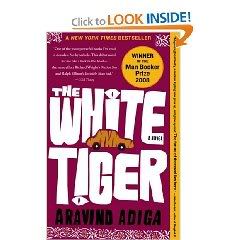The White Tiger
What's astonishing about "The White Tiger" isn't Adiga's depiction of the social and economic inequalities of contemporary India. Other writers--Rohinton Mistry in " A Fine Balance," Kiran Desai in "The Inheritance of Loss," among others--have written very good novels about this. What is astonishing is the economy with which he does it. Novels about societal inequities are often lengthy; think of a novel by Dickens or Stowe or Dreiser or Steinbeck, in which the accumulating weight of the details of suffering creates a powerful impression. Adiga creates two disparate worlds, Balram's tiny native village in the Darkness and the sliver of Delhi he inhabits in his life as a driver for the urbanized son of the village landlord. The first is a place of absolute hopelessness presided over by allegorical figures of corrupt wealth: the four landlords known as The Stork, The Buffalo, The Wild Boar, and The Raven. From afar (and occasionally up close) The Great Socialist is re-elected again and again through promises of change (always unkept) and corrupt electioneering. Balram's family, it is clear, will be poor forever. The city, for Balram, consists of the glittery American-style mall (which he can't enter); the air-conditioned Honda that he drives; and the red bag stuffed with cash for politicians with power over The Stork's businesses. These two settings (and the human animals that inhabit them) set out a chasm that is utterly unbridgeable. Thus, when Balram murders his master (a fact established at the very beginning of the novel), it seems less a tragedy than the outcome of impeccable logic. I kept thinking of Dreiser's Sister Carrie, another small town character who migrates to the city. But where Dreiser is intent on portraying Carrie as someone crushed by grinding social forces far beyond her control, Adiga deftly portrays Balram as an entrepreneur, one whose tiger's leap across the chasm is equally the product of social forces he cannot control. This leap leads to a 21st century ascent (in social and economic terms) not a 19th century descent.
Note: I've just read that Adiga won the Man Booker prize. I would have hated to have had to choose between a book as fine as this one and two other nominees, Sebastian Barry's "The Secret Scripture" and Philip Hensher's "The Northern Clemency."
Labels: best books, books review, The White Tiger


